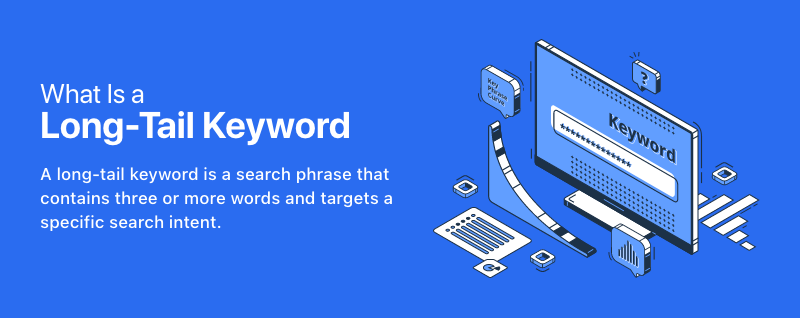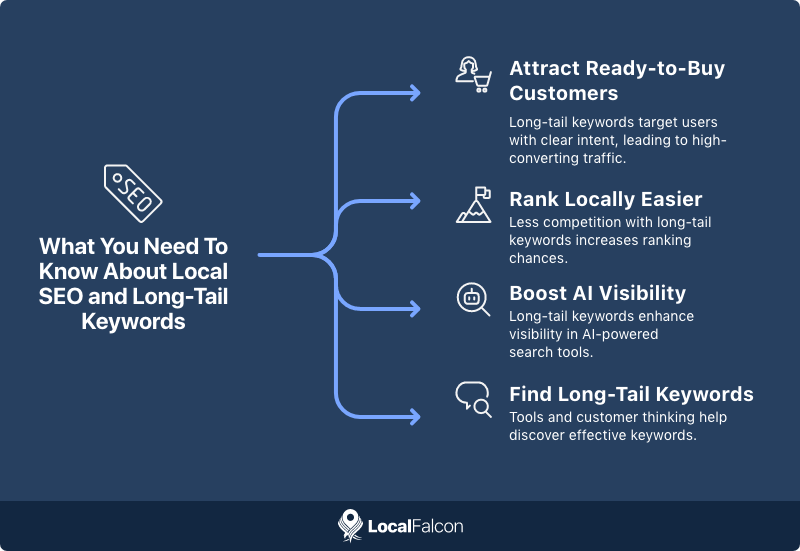When it comes to optimizing for local search, many business owners and marketers tend to focus on broad, highly competitive keywords (think "dentist" or "pizza restaurant"). While these terms may seem like obvious targets, they're often difficult to rank for, especially if you're competing against large, established brands or national chains. That's where long-tail keywords come in.
Long-tail keywords are longer, more specific search phrases that often have lower competition and higher conversion potential. They may not generate as much traffic as broader short-tail keywords, but the traffic they do attract is typically more qualified and more likely to result in leads, appointments, or sales.
In this article, we'll break down what long-tail keywords are, why they're essential for local SEO, and how you can use them to improve your search visibility and attract more local customers.

What Is a Long-Tail Keyword?
A long-tail keyword is a search phrase that contains three or more words and targets a more specific search intent. These keywords typically have lower search volumes compared to broad, generic keywords, but they tend to attract users who are closer to making a decision or taking action.
For example, instead of targeting a broad keyword like "plumber," a local plumbing business might target a more specific long-tail keyword such as "emergency plumber open now in Chicago" or "affordable water heater repair near me."
These days, long-tail keywords are getting even longer, due to the rise of what are known as conversational keywords or queries. These are often fully articulated questions or instructions, such as those typed into AI assistants or spoken into voice search tools. By targeting long-tail keywords, local businesses can often compete more effectively in search results without needing massive budgets or complex SEO strategies.
Although targeting a mix of short- and long-tail keywords has always been important for SEO, targeting these types of conversational queries is more important than ever in the AI era. It can help you increase your AI visibility in AI-powered tools and features, from Google's AI Overviews to ChatGPT responses.
Long-Tail Keyword Examples
Here are a few examples of traditional long-tail keywords that local businesses might target:
- "Custom birthday cake shop in Seattle"
- "Emergency roof repair after storm in Miami"
- "Quiet coffee shops with WiFi near me"
And here are a few examples of the types of conversational long-tail keywords that people favor when searching for information via AI tools:
- "Where can I get my oil changed right now within a 15-minute drive of downtown Portland?"
- "Give me some options for a romantic dinner with a view in Montreal"
- "Can you list a few different web development and SEO companies in Erie, PA?"

Traditional Long-Tail Keywords vs. Conversational Keywords
The key difference between traditional long-tail keywords and conversational keywords is that the latter don't typically surface in traditional keyword research tools. They're too long and don't have enough traditional search volume to show up in these tools.
On the other hand, you can usually come across long-tail keywords that have around 4 to 7 words in tools like Semrush or Ahrefs, and these are great terms to target on your website to help it rank higher on Google and other search engines.
That being said, it's still important to research and target conversational long-tail keywords for local SEO to increase your chances of appearing in AI-generated summaries and responses. Even if they don't have a significant volume of traditional search traffic, they help local search algorithms and large language models associate your business with specific topics, services, and locations (i.e., "entities").
Over time, this strengthens your overall online presence, making it more likely for your business to appear in both traditional search results and AI-driven answers when potential customers are looking for products or services like yours (or related information).

What You Need To Know About Local SEO and Long-Tail Keywords
Now that we've answered the core question: "what is a long-tail keyword?" and looked at long-tail keyword examples, let's talk about how you can actually use them to improve your local SEO strategy.
1. Long-Tail Keywords Help You Attract Ready-to-Buy Customers
Users searching with long-tail keywords often have a very clear intent. Someone searching for "same-day AC repair near me" isn't just browsing. Instead, they're looking for immediate service. Thus, these types of keywords are often tied to high-converting traffic, making them especially valuable for local businesses.
2. They Make It Easier to Rank Locally
Broad keywords are saturated with competition, especially from large brands, directories, or marketplaces. Long-tail keywords give you a more realistic chance of ranking well in Google's local results because fewer businesses are targeting the exact same phrases.
3. They Boost Your Visibility in AI-Powered Search Tools
With the growing influence of AI tools like Google's AI Overviews and ChatGPT, long-tail and conversational keywords are becoming even more essential. These tools often surface local business information in response to highly specific, conversational queries.
Naturally incorporating long-tail keywords, both traditional and conversational, into your content may increase the chances of your business showing up in AI-generated overviews or answers to such specific queries.
4. How To Find Long-Tail Keywords for Local SEO
Here are a few simple ways to discover long-tail keywords for your business:
- Use tools like Google Search Console, Semrush, or Ahrefs to find longer search queries driving traffic.
- Check the "People also ask" section in Google Search for question-based phrases related to your services.
- Use AI tools to brainstorm conversational keyword ideas.
- Think like your customer: what specific services, locations, or situations would they search for?
- Use Local Falcon's Local Keyword Tool to generate hyperlocally targeted lists of long-tail keywords for both traditional and AI search.
Final Takeaway: Long-Tail Keywords Are the Local SEO Edge Most Businesses Overlook
If you've been wondering what long-tail keywords are and whether it's worth focusing on them for local SEO, here's the truth: targeting long-tail keywords is essential to any local SEO strategy, especially in the AI era.
With search behavior shifting towards more specific, conversational queries, especially in AI-powered tools, businesses that continue chasing only broad, generic keywords risk getting left behind in terms of visibility. The future of local search belongs to those who understand how customers actually search, both when they're in the research phase and ready to act.
Whether it's a traditional long-tail phrase like "best family dentist near me" or a voice-style query like "who can fix a broken window in South Shore tonight," these keywords help connect your business with real people making real decisions.
So, instead of only chasing high-volume traffic for the sake of it, start thinking about the specific, meaningful searches your ideal customers are typing or speaking today. Targeting these types of high-intent searches will help boost your overall local search visibility and connect you with more potential customers ready to buy!


